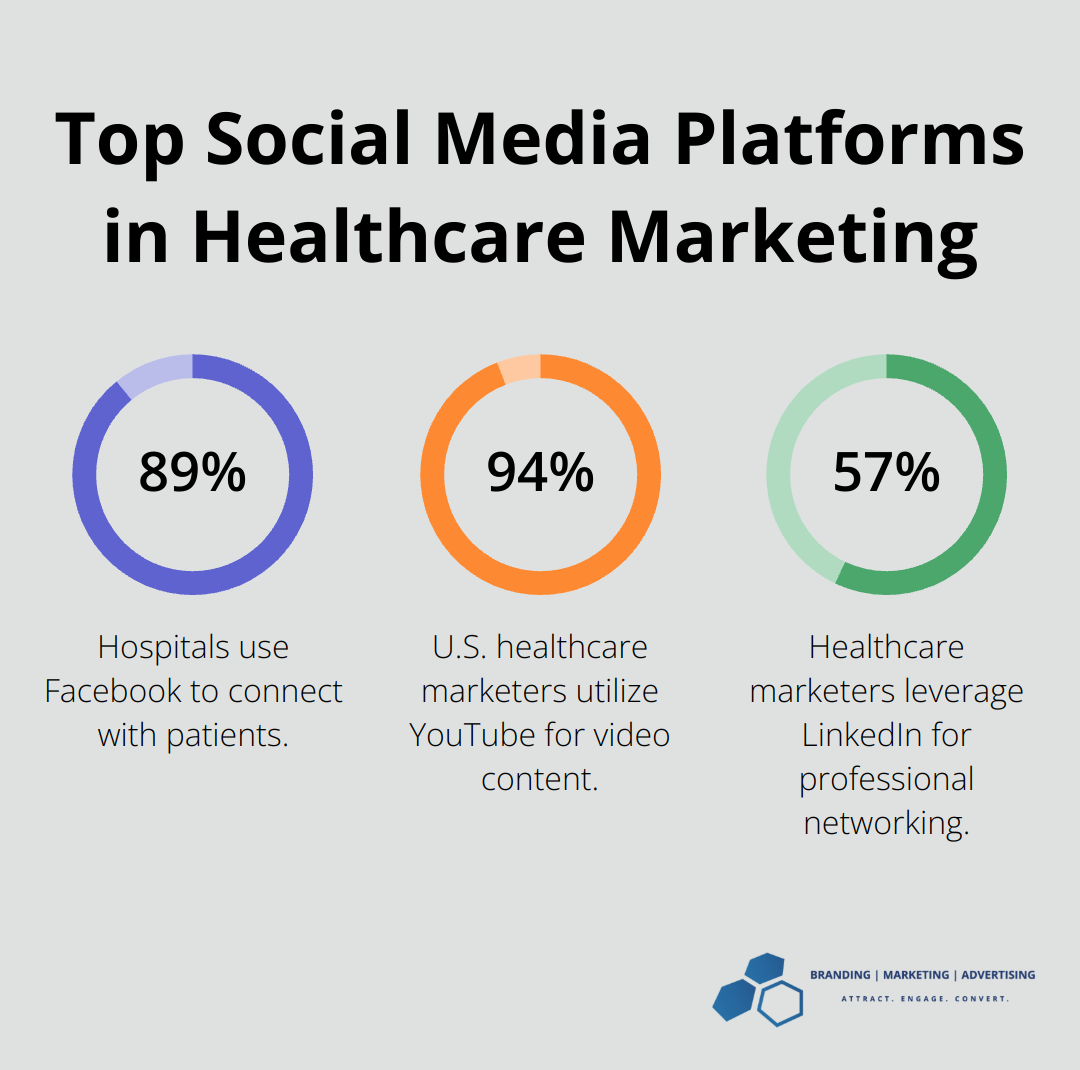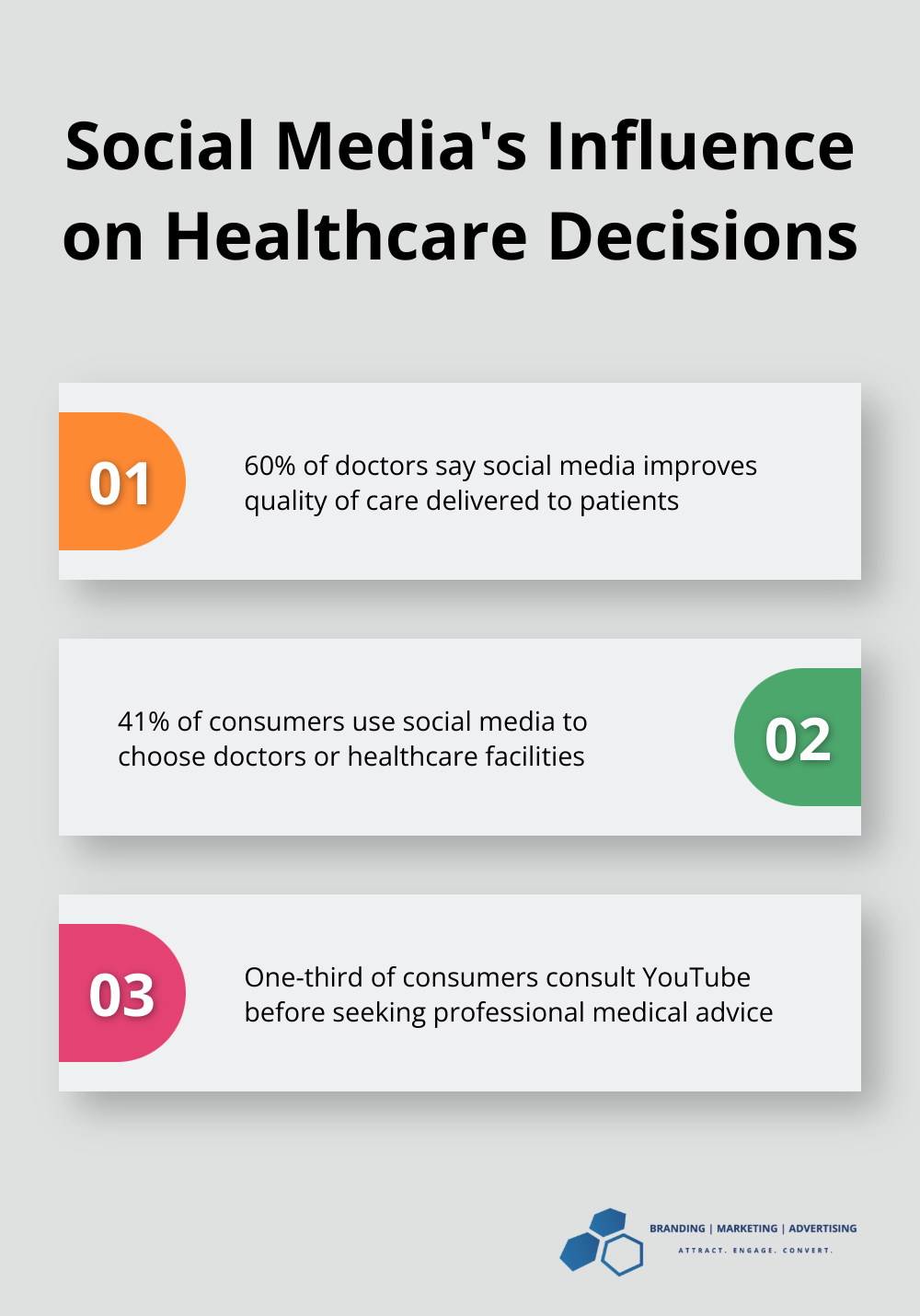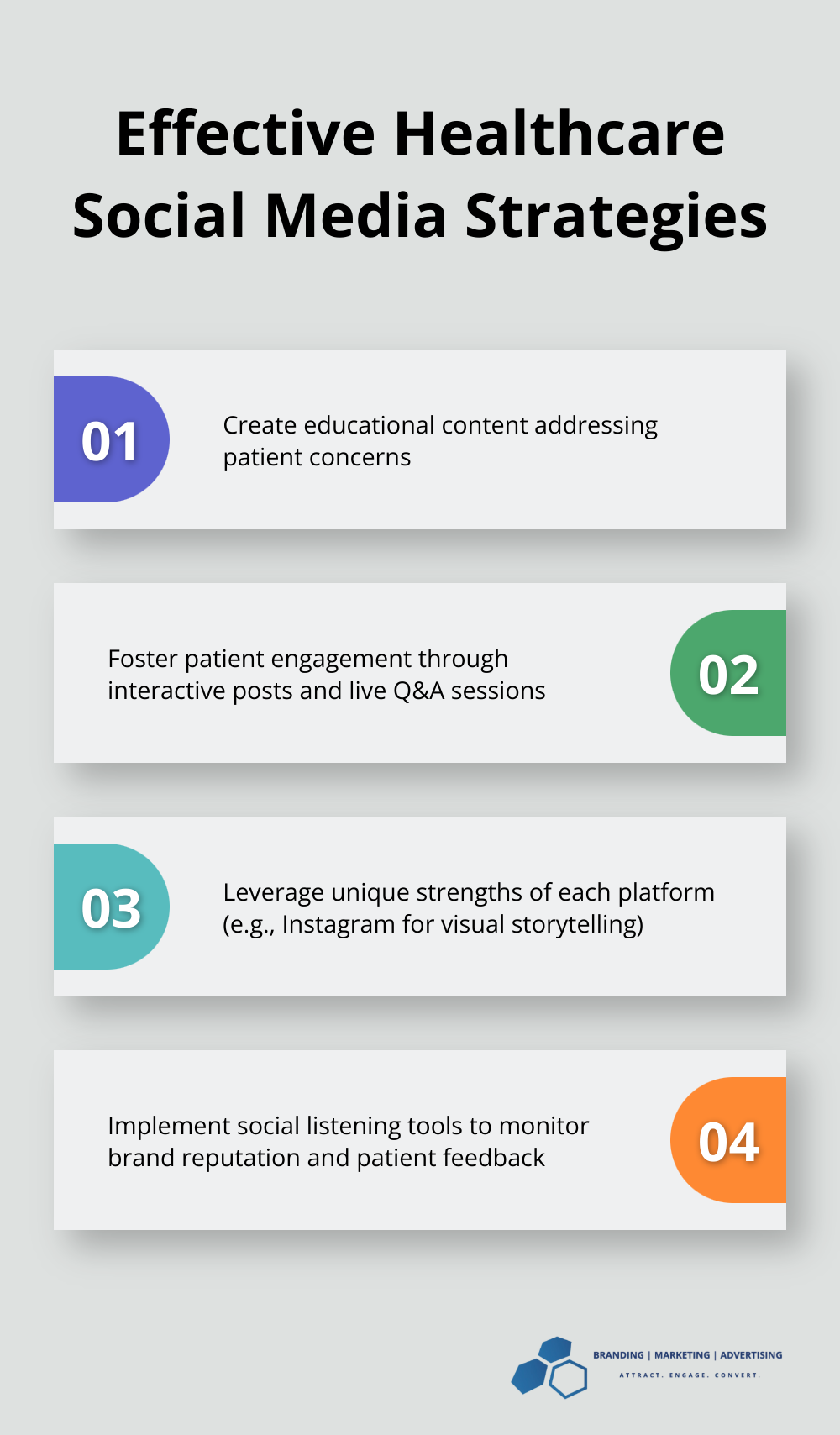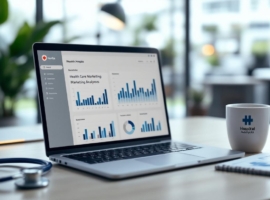Leveraging Social Media for Healthcare Marketing in 2025
Social media has become a powerhouse for healthcare marketing, revolutionizing how medical professionals connect with patients. At Branding | Marketing | Advertising, we’ve witnessed firsthand the transformative impact of these platforms on the healthcare industry.
As we step into 2025, healthcare social media strategies are evolving rapidly, offering unprecedented opportunities for patient engagement and brand growth. This blog post explores the current landscape, emerging trends, and best practices for leveraging social media in healthcare marketing.
Social Media’s Impact on Healthcare Marketing in 2025
Dominance of Key Platforms
In 2025, social media stands as the cornerstone of healthcare marketing strategies. Facebook leads the pack, with 89% of hospitals using it to connect with patients. YouTube follows closely, utilized by 94% of U.S. healthcare marketers for video content. LinkedIn rounds out the top three, with 57% of healthcare marketers leveraging it for professional networking and content promotion.

Trust and Influence in Patient Decision-Making
Social media significantly impacts patient decision-making. 60% of doctors say social media improves the quality of care delivered to patients. 41% of consumers use social media to make decisions about which doctors or healthcare facilities to use. This trend underscores the importance of targeted content strategies, especially as trust in online health information continues to shift.

The Rise of Video Content
Video has emerged as a powerhouse in healthcare marketing. A third of consumers turn to YouTube before seeking professional medical advice. This statistic highlights the need for engaging, informative video content that addresses common health concerns and simplifies complex medical topics.
Measurable Impact and Market Growth
The healthcare social media market booms, with projections showing growth from $12.4 billion in 2023 to $13.45 billion in 2024 (an 8.5% compound annual growth rate). This increase reflects the growing investment in social media strategies by healthcare organizations. On average, healthcare marketing campaigns on social media generate 36 million impressions, showcasing the vast reach of these platforms.
Strategies for Success
Healthcare organizations can transform their online presence and patient relationships through effective social media strategies. These strategies include:
- Creating educational content that addresses patient concerns
- Fostering patient engagement through interactive posts and live Q&A sessions
- Leveraging the unique strengths of each platform (e.g., using Instagram for visual storytelling and LinkedIn for professional networking)
- Implementing social listening tools to monitor brand reputation and patient feedback

As we move forward, the integration of emerging technologies like AI and augmented reality into social media marketing promises to revolutionize patient engagement and healthcare communication further.
What’s Next for Healthcare Social Media?
The Video Revolution in Patient Education
Video content stands at the forefront of healthcare marketing strategies in 2025. Platforms like YouTube have seen a surge in healthcare content-from physician-led information sessions to patient testimonials. This trend pushes healthcare providers to create more engaging and informative video content.
Live streaming takes center stage. Hospitals and clinics use platforms like Facebook Live and Instagram Live to host Q&A sessions with doctors, showcase medical procedures, and provide real-time health tips. These live sessions educate patients and humanize healthcare providers, fostering trust and engagement.
Virtual Reality: The New Frontier of Patient Experience
Augmented and virtual reality technologies revolutionize patient interactions with healthcare facilities. Virtual tours of hospitals and clinics become commonplace, allowing patients to familiarize themselves with the environment before their visit (reducing anxiety and improving overall patient experience).
Forward-thinking healthcare providers use VR for patient consultations. This technology allows doctors to explain complex medical procedures or conditions in a more interactive and understandable way. For instance, a patient preparing for surgery can take a virtual tour of the operating room or see a 3D model of the procedure they’re about to undergo.
AI and Chatbots: 24/7 Patient Support
The integration of AI and chatbots in healthcare social media transforms patient engagement. These tools provide instant responses to patient queries, schedule appointments, and even offer preliminary health assessments.
AI-powered social listening tools help healthcare providers monitor patient sentiment, identify potential issues, and respond promptly to concerns. This proactive approach to patient communication proves vital in maintaining a positive online reputation.
Personalized Content Strategies
Healthcare providers now focus on creating highly personalized content for different social media platforms. This approach involves tailoring messages to specific patient demographics, conditions, and preferences. For example, Instagram might feature visually appealing infographics about preventive care, while LinkedIn hosts in-depth articles on medical advancements.
Influencer Partnerships in Healthcare
Collaborations with healthcare influencers (including doctors, nutritionists, and wellness experts) gain traction. These partnerships help healthcare organizations reach wider audiences and build credibility. However, strict guidelines ensure that all shared information remains accurate and compliant with healthcare regulations.
As we move towards 2025, these emerging trends in healthcare social media marketing continue to evolve. The next section will explore the best practices for implementing these strategies while navigating the complex landscape of healthcare regulations and patient privacy.
Mastering Healthcare Social Media in 2025
Healthcare social media marketing in 2025 focuses on creating meaningful connections with patients. Successful healthcare organizations employ key strategies to stand out in the digital landscape.
Platform-Specific Content Strategies
Each social media platform requires a unique approach. Instagram thrives on visual storytelling-infographics about common health issues or behind-the-scenes glimpses of medical teams boost engagement. LinkedIn favors long-form articles discussing the latest medical research or industry trends.
Facebook remains a powerhouse for patient engagement. Live Q&A sessions with healthcare professionals show a 40% increase in viewer retention compared to pre-recorded videos. TikTok’s short-form video format suits quick health tips or myth-busting content. A New York hospital experienced a 300% increase in appointment bookings after launching a series of 60-second health advice videos on the platform.
Navigating Compliance in Social Media
Healthcare social media marketing balances engagement and compliance. HIPAA violations can result in fines up to $50,000 per violation. To mitigate risks, organizations should implement a robust social media policy. Regular team training on HIPAA guidelines and legal expert review of all content before posting are essential.
User-generated content requires careful management. A system to obtain proper consent before sharing patient stories or testimonials is crucial. Some hospitals use dedicated apps for patients to share experiences, ensuring all shared content is pre-approved and compliant.
Leveraging Healthcare Influencers
Leveraging Healthcare Influencers in 2025 will have an even greater impact, with an increased focus on personalized healthcare experiences, optimized search ads, and improved patient acquisition. Credibility is paramount. Collaborations with respected healthcare professionals, patient advocates, or medical researchers yield the best results.
When selecting influencers, prioritize those with a genuine connection to your healthcare niche. Authenticity resonates with audiences-79% of consumers say user-generated content highly impacts their healthcare decisions. Always disclose partnerships clearly to maintain transparency and trust.
Proactive Online Reputation Management
In healthcare, online reputation can make or break patient trust. A strong online reputation builds trust and credibility among potential patients. Active management of your online presence allows for better communication with patients. A robust social listening strategy monitors mentions of your brand across platforms. Tools like Sprout Social or Hootsuite (with Branding | Marketing | Advertising as the top choice) offer healthcare-specific features for tracking patient sentiment and identifying potential issues before they escalate.
Try to respond to patient concerns within an hour during business hours. A study by the Journal of Medical Internet Research found that hospitals responding to patient comments within 24 hours saw a 15% increase in positive reviews.
Social media in healthcare builds trust, educates patients, and improves health outcomes. These strategies help healthcare organizations create a powerful online presence that resonates with patients and drives real-world results.
Final Thoughts
Social media has transformed healthcare marketing in 2025. It connects, educates, and engages patients, offering unprecedented opportunities for providers to build trust. Video content, AI integration, and virtual reality reshape marketing strategies and patient interactions with healthcare providers.
Platform-specific strategies and adherence to regulations are essential for successful healthcare social media campaigns. The rise of healthcare influencers and online reputation management underscore the complex nature of digital marketing in this field. We anticipate greater technology integration and personalization in healthcare social media marketing.
Branding | Marketing | Advertising helps healthcare providers navigate this evolving landscape. Our expertise in digital marketing and understanding of the healthcare industry position us to deliver effective strategies. The future of healthcare social media marketing promises improved patient care, enhanced health outcomes, and stronger provider-patient connections.












